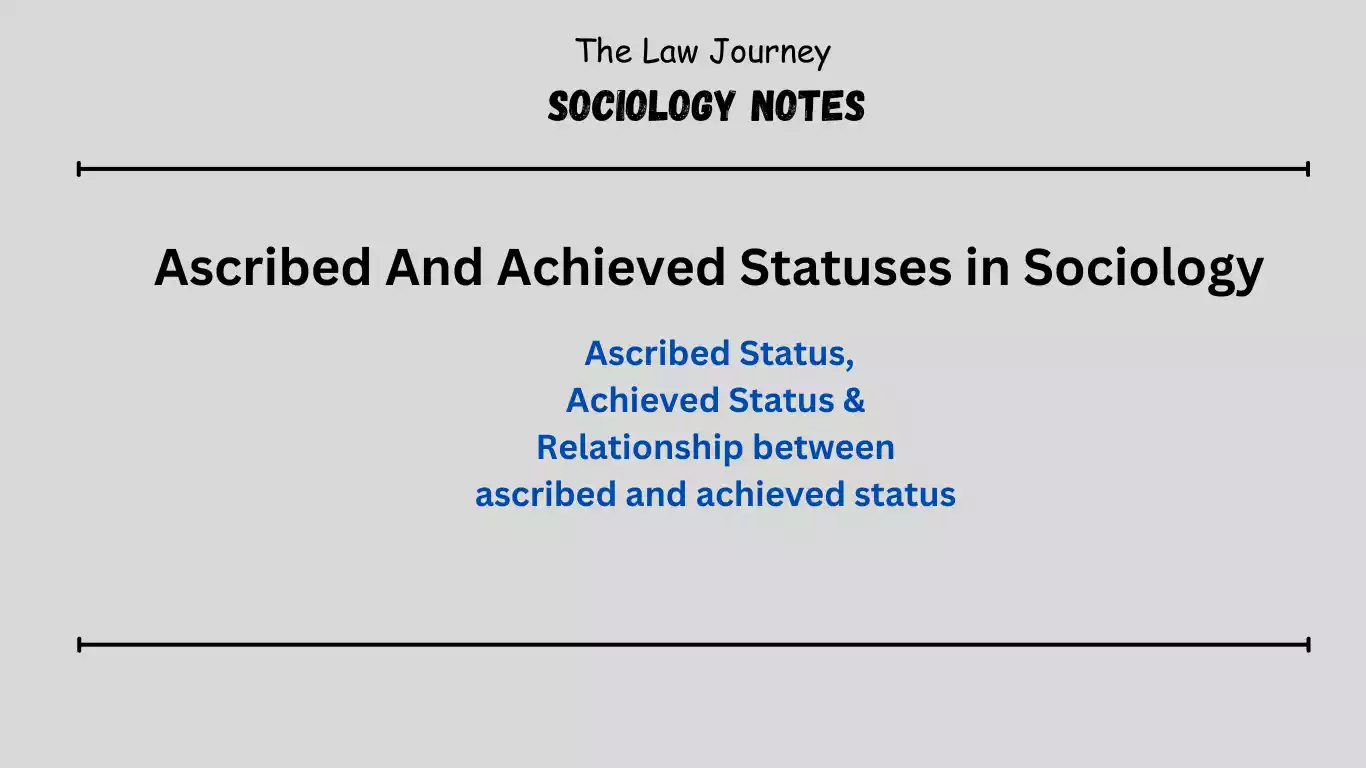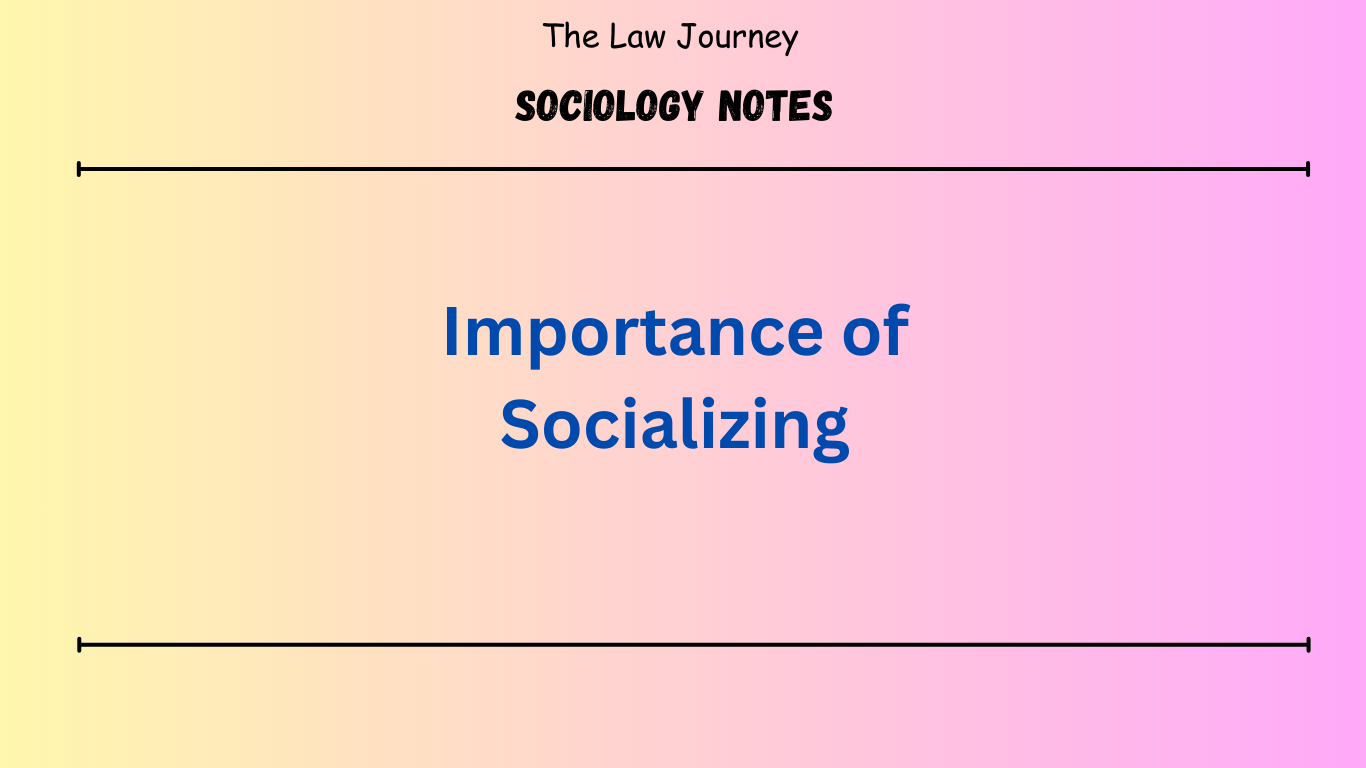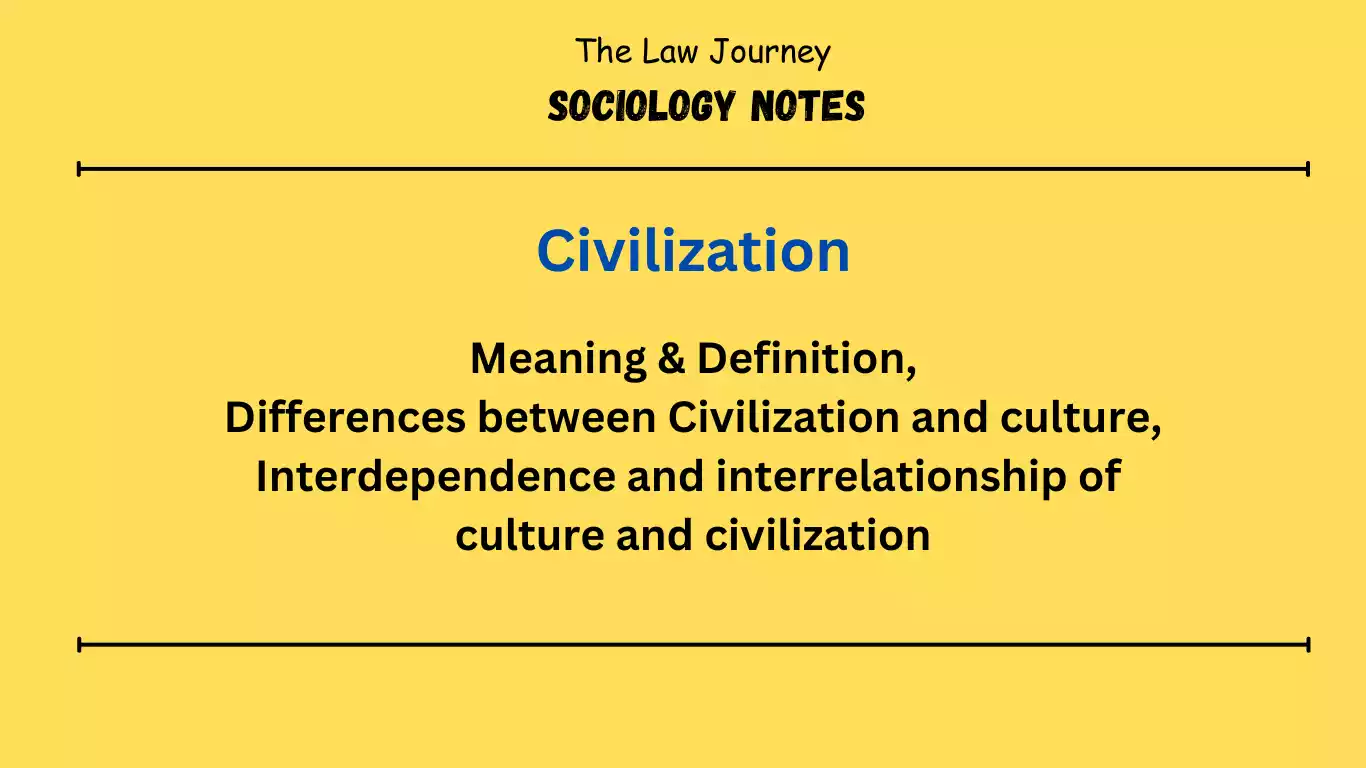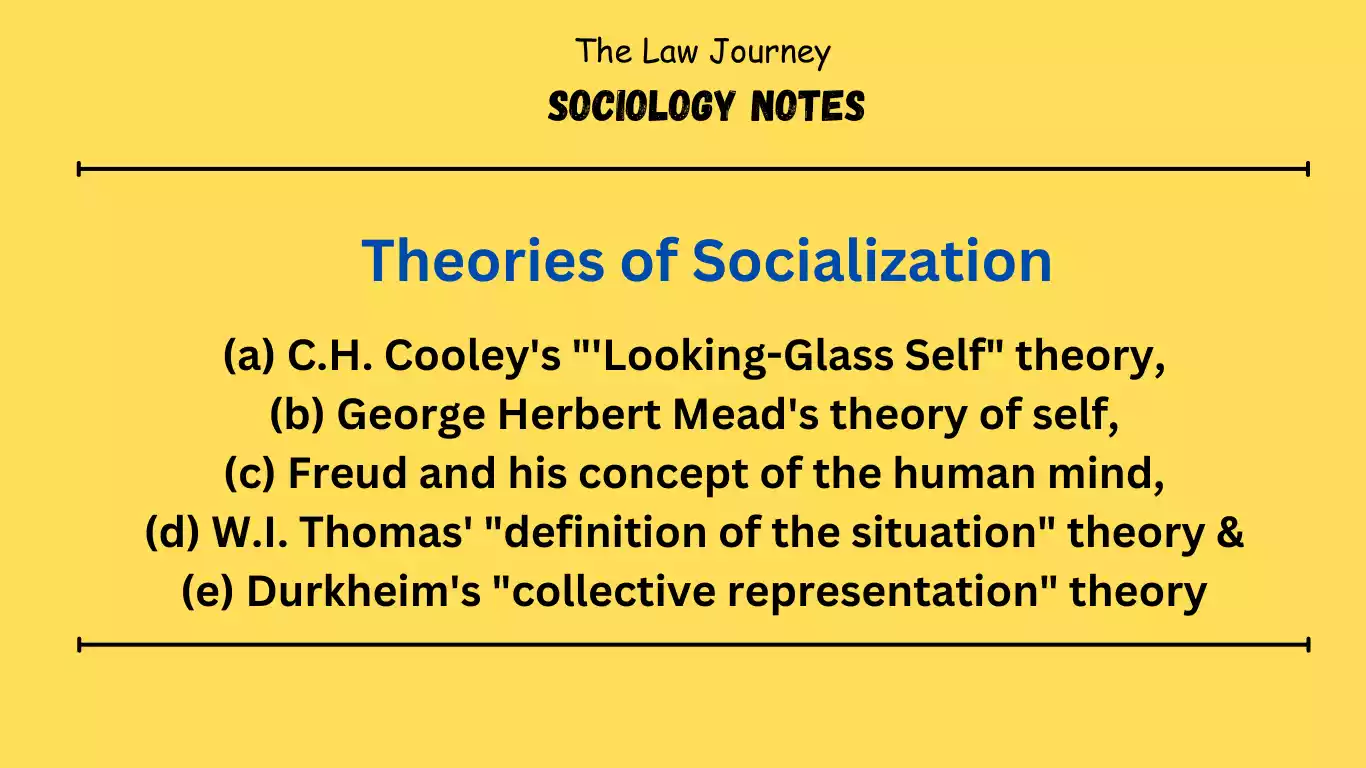Ascribed And Achieved Statuses in Sociology – There are two ways for individuals to gain status in society: by ascription or achievement. Some statuses are unavoidable for individuals, while others are more or less freely chosen by individuals. Linton uses the concepts of “ascription” and “achievement” to describe this status distinction. Some statuses are “achievement” to individuals, while other statuses are achieved by individuals.
In some societies, there may be more status conferred than achieved, and vice versa in others. But strictly speaking, all societies use both the principle of belonging and the principle of achievement to guarantee the status of their members.
1. Ascribed Status | Ascribed And Achieved Statuses in Sociology
An ascribed status is one over which the individual has no choice. These arise from membership in involuntary groups, such as gender groups, age groups, or racial groups. Newborns acquire such status during the early stages of socialization itself. In reality, these statuses are assigned to individuals before they know their potential. These statuses “clearly determine and limit the range of statuses” that he can later achieve or seek to achieve.
Status is typically ascribed based on the following considerations:
- Sex
An individual’s gender is a clearly visible physiological fact. It appears at birth and persists throughout life. A person is born male or female and remains male throughout life. This gender difference is considered one of the basis for the ascription of personal status. Part of the status achieved is influenced by this gender factor. It is a mistake to think that the division of status between men and women is primarily based on the inherent characteristics of men and women. This is because biological characteristics cannot explain the differences in behavior between men and women.
Furthermore, social differences themselves are not fixed, but change from society to society and from era to era. Example: In the Chamburi tribe, women are the breadwinners, but men are responsible for the household chores and spend their time combing their hair, wearing different types of beads, and other types of decorations.
Among the Mundugumor, females and males are equally aggressive. Among the Trobriand Islanders, except for breastfeeding, all other childcare duties are performed by the father. In some tribes, fathers teach their sons the art of dancing. These differences cannot be explained by biological properties themselves.
In today’s complex society, the status given to women has changed significantly. There is still a certain division of roles between men and women. Today, women are not excluded from professional life, but they are at a disadvantage when competing with men in certain fields, such as medicine. Law, university teaching, factory work, defense, industry, etc. Indeed, it is excluded from operations such as coal mining, steel construction, and undersea tunneling. For women, this means that their assigned status limits their ability to achieve the status they achieve.(Ascribed And Achieved Statuses in Sociology)
2. Age
All societies recognize age-related differences in status and roles. Like sex, it is a clear and clearly visible physiological fact. Unlike gender, age does not lead to permanent status over a lifetime. Age is not a fixed thing, it is always changing, and age relationships between certain people, such as father and son, younger brother and older brother, are fixed throughout life. However, all living people are exposed to various aging conditions throughout their lives.
Most societies recognize five major age states: infancy, childhood, adolescence, adulthood, and old age. In some societies, the unborn and the dead are also considered two special ages, each with their own meaning. It is believed that fetuses are the spirits of deceased ancestors. Hindus vaguely think of fetuses as spirits of the “souls” of people who lived in previous lives, or “jammas.”
In settled cultures, personal power and prestige typically increases with age. The old is trying to retain its former power. We can also expect them to play an active role in society, especially for political and administrative purposes. They can stay in power. For an advantage based on knowledge and experience. Young people may appreciate or even envy this advantage. This advantage is firmly established in organizational societies through the ascription of status based on age. Social status is given not only to living individuals but also to those who have passed away. (Ascribed And Achieved Statuses in Sociology)
The main reason is that the living are descendants of the dead, both physically and socially. The practice of ancestor worship shows a clear recognition of the status of the dead. Hindus have a Shraddha ritual where they offer sacrifices to the dead. In some societies, great people are remembered for their deeds. In this case, the status would indicate the achieved status. ”
Finally, as Ralph Linton pointed out, “Biological factors play a role in age, just as they do in gender.” Related people appear to be secondary to cultural people in determining the content of status.(Ascribed And Achieved Statuses in Sociology)
3. Kinship
Kinship status provides information about a person’s relationship with their parents and siblings. A newborn’s status in the community is usually equated with that of its parents. This attribution is highly arbitrary, as there is no necessary connection between the parents’ abilities and the children’s abilities. Smart children can be born to stupid parents, and vice versa. Still, it is socially rational to connect children to society through their parents. When a child is born, the father and mother are responsible. They socialize him only in the early stages. It is only natural that a child’s first social relationship is with their parents.(Ascribed And Achieved Statuses in Sociology)
Much of a significant child’s status depends on kinship factors. For example, the attribution of citizenship, religious affiliation, and community affiliation is almost always a matter of identification with one’s parents. Class or caste status is passed down from parents to children.
Through kinship, children not only acquire social status but also status within the family. The child acquires the status of son or daughter. To the parents’ relatives, he may be a grandson, nephew, brother, cousin, or son. Kinship involves mutual rights and obligations. Even in modern society, kinship relationships remain socially important, even if kinship relationships have not expanded. In some societies, much of social life is determined by them.(Ascribed And Achieved Statuses in Sociology)
Other grounds for Ascription
In addition to age, gender, and kinship, there are other grounds for ascribing status. Because an individual already has certain racial characteristics at birth, a racial status can be assigned to that person. Individuals have no choice about their place of birth and are therefore assigned regional and national status. These can be changed later, but there is no initial selection.
Similarly, our religious status is assigned at birth, so we are born as Hindus, Christians, Muslims, etc. However, you can also obtain another religious status later. Our original class status also plays a role. At birth, we assume the class position of our parents because we have no choice. However, you can change it later. However, the caste status assigned at birth cannot be changed.
For example, illegitimacy prevents full identification with parents. Similarly, the total number of children born in the family, the fact of adoption, the death of parents, the occurrence of divorce can affect the status of a child, regardless of his will. Therefore, “accidents of birth” are universal and extremely important in society.(Ascribed And Achieved Statuses in Sociology)
2.The Achieved Status | Ascribed And Achieved Statuses in Sociology
The status a person can choose is any achieved status, no matter how big or small. Every society has a certain achieved status, and no society is completely dependent on the status it has been given. The proportion of positions that lead to success in social structures varies widely around the world.
Even if a society takes great care in assigning certain positions to its members, some people may change their assigned positions within an organization because of particular talents or ambitions. The history of all societies and eras is full of their names. Because they are the ones who make history. In order to use their abilities for society’s common purposes, society institutionalizes the acquisition of status. In this way, society can capitalize on deviance rather than punishing it.
Furthermore, by legitimizing certain status changes, societies can accommodate members with unusual abilities for statuses for which average abilities are inadequate. It can also prevent some incompetent people from reaching high positions. Leaders of combat units, creators of works of art, and inventors are examples of positions where society might reward merit rather than ascribing a minority status based on birth.
In modern civilized society, most professional positions have been achieved. The presence of many secondary groups indicates that our organizational membership has achieved status. Marital status, parental status, educational status, etc. are all accomplished. Because you have no obligation to be a husband, wife, parent, or an educated person. The great function of a social structure with many achieved statuses is not to ensure the isolation of roles, but rather to link them into necessary interdependencies. Structures characterized by achieved statuses increase competition for those statuses, but role specialization also requires cooperation.(Ascribed And Achieved Statuses in Sociology)
Relationship between ascribed and achieved status
Ascription and achievement of statuses are closely related in any society. Although they are contradictory in principle, they are indispensable to society because they complement each other functionally. For the purpose of socialization, that is, the introduction of an individual into the culture of a group, the person must be placed somewhere in the social structure at birth.
This initial placement or ascription may be a matter of purely arbitrary social rules based on some external factors. However, the individual’s achievements must be recognized later. That’s quite an accomplishment. His initial placement itself may have influenced his achievements .
Even if you achieve all the stats, some stats may not be filled. If all status were ascribed, there would be little room for human creativity and talent. Ascribed status conveys a sense of security that purely achieved status can never convey. We cannot expose our entire lives to competition. You don’t have to face a life where everyone around you is a potential competitor for all the fame and fame you can achieve. On the one hand, the value of the achieved status lies in the fact that it not only puts the right people in the right place, but also stimulates effort and success.(Ascribed And Achieved Statuses in Sociology)
Ascribed status is a set of achieved statuses. You can compete for some of them, but you don’t have to compete for all of them. A man’s ascribed status frees him from competition for various positions, such as hospital nurse, kindergarten teacher, babysitter, etc. The ascribed status of old age frees one from the competition for status that comes with youth.
Therefore, Ascription can to some extent relieve the pressure on free choice. Achieved status gives individuals a certain degree of freedom to choose their favorite job and perform it well, but by motivating people to pursue status and ultimately perform their duties, It also contributes to the survival of social structures.(Ascribed And Achieved Statuses in Sociology)
Note that societies vary widely in terms of status. For example, in medieval society, religious status, class status, and even professional status were ascribed. They could not be reached. In totalitarian societies, even in the 20th century, political status was usually ascribed. In some societies, the occupational status of all members varies according to age, gender, and kinship.
In caste societies like India, caste status is determined by kinship. However, in more “liquid” societies with class structures, class status is usually achieved. In “free societies” where there are a large number of voluntary associations, the status achieved is greatest.(Ascribed And Achieved Statuses in Sociology)
Related Post | Ascribed And Achieved Statuses in Sociology
- Political Notes
- Concept of Social Groups in Sociology
- moot court memorial making service
- legal project maker
- moot memorial proposition maker
- RTI notes
- Legal History Notes
- Law of Torts notes
- moot court memorial maker
- law project maker
Ascribed Status means ?
An ascribed status is one over which the individual has no choice. These arise from membership in involuntary groups, such as gender groups, age groups, or racial groups. Newborns acquire such status during the early stages of socialization itself.
Achieved Status means ?
The status a person can choose is any achieved status, no matter how big or small. Every society has a certain achieved status, and no society is completely dependent on the status it has been given. The proportion of positions that lead to success in social structures varies widely around the world.(Ascribed And Achieved Statuses in Sociology)
Reference Books | Ascribed And Achieved Statuses in Sociology
- C.N. Shankar Rao – Principle of sociology with an introduction to social thoughts
- Social Change in Modern India by M N Srinivas
- A Dictionary of Sociology by John Scott
- Introduction to Sociology by Anthony Giddens
- Handbook of Indian Sociology by Veena Das
- Sociological Theory by George Ritzer

















